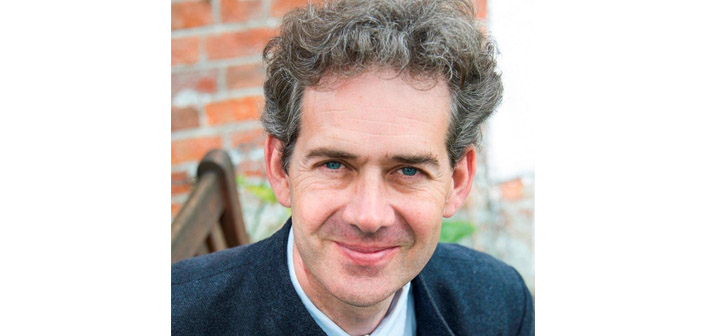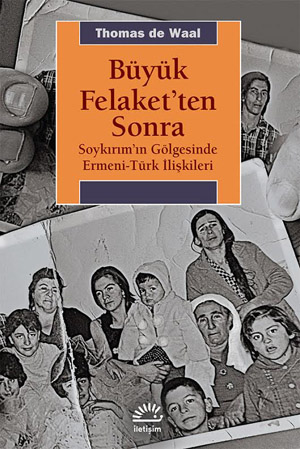‘Şimdiki zaman tarihçisi’nden Ermeni-Türk ilişkileri


Yeni kitabınızda Ermeni-Türk ilişkilerini tarihsel bir perspektifle sunuyorsunuz. Bu kitabı yazma fikri sizde nasıl doğdu?
Meslek hayatımın büyük bir kısmını ya Rusya’da ya da Ermenistan, Azerbaycan ve Gürcistan gibi Güney Kafkasya topraklarında geçirdim. ‘Doğu Ermenistan’ ve Dağlık Karabağ’a yaptığım ziyaretler sayesinde Ermenileri daha yakından tanıdım. Fakat düzenli olarak yaptığım bu seyahatlerde, Ermenilere dair kavrayışımda büyük bir eksiklik olduğunu hissediyordum. Yerevan’dayken birdenbire ufukta gördüğünüzde sizi şaşırtan Ararat Dağı’nın muazzam varlığının verdiği his gibiydi biraz; aslında hep orada ama işte bazen insanın gözüne görünmüyor. O kayıp parça ‘uzaktaki o dağ’ tabii ki şimdi 1915-16 Ermeni Soykırımı olarak adlandırdığımız olaylar sırasında yiten insanlar, kaybedilen Ermeni anavatanının sebep olduğu dehşet ve onun modern Ermenistan tarihi üzerindeki etkisiydi.
Benim için dönüm noktası, New York Başepiskoposu Barsamian’ın beni Amerikalı Ermenilerin Türkiye’nin doğusuna yapacağı hac yolculuğuna davet etmesi oldu. Atalarının topraklarını ziyaret eden, çoğu yaşlılardan oluşan bir grup Ermeni ile geçirdiğim birkaç gün, unutulmaz ve dokunaklı bir deneyimdi. Bu kadar etkilenmemin ilk sebebi, yolculukta o insanların içinden dökülüveren unutulmaz aile hikâyeleriydi. İkincisi, bu tarihi yerleri ziyaret edebilme şansını yakalamış olmamdı. Üçüncüsü de bu yolculuğu yaptığım 2012 yılında Doğu Anadolu geçmişini ve tarihini kabulleniyordu; tanıştığımız Türklerin ve Kürtlerin neredeyse hepsi çok samimi davrandılar. Hem Türkler hem de Kürtler bölgelerinin Ermeni mirası ve 1915-16’da ne kadar çok şey kaybedildiği konusunda son derece samimi ve dürüstlerdi.

Benim için bu yolculuk, bu zor ve karmaşık meselenin kapısını açan anahtar oldu. Sonraki yıllarda birçok Ermeni, Kürt ve Türk ile uzun uzun konuşarak, Ermeni-Türk ilişkilerini keşfederek epey zaman geçirdim. Ben akademik olarak tarihçi değilim; seçkin tarihçilerin on yıllardır çalıştığı bir alana katkı sunmaya kalkışmam uygun olmazdı. Fakat kendimi, yakın geçmiş ve tarihin bugüne etkisi üzerine çalışan ve zamanın siyasi bağlamını iyi kavrayan bir ‘şimdiki zaman tarihçisi’ olarak tanımlayabilirim. Kitabımın teması da bu zaten; işlerin neden bu kadar değiştiğini ve olaylardan yüz yıl sonra bile bu meselenin neden hâlâ bu kadar sancılı olduğunu irdeleyen, 1916 sonrası Ermeni-Türk ilişkilerinin ‘tarihinin tarihi’ üzerine bir çalışma.
Şu anki Ermenistan-Türkiye uzlaşma süreci hakkında ne düşünüyorsunuz? Size göre ne gibi engeller var?
Bardağın yarısı dolu mu, boş mu diye sorulur ya hani, bu da biraz ona benziyor. Yani nereden baktığınıza bağlı. İyimser olan biri, bardağın yarısının dolu olduğunu söyleyecektir ama kötümser olan ise yarısı boş bir bardak görecektir. Ermenistan-Türkiye ilişkileri konusunda hâlâ bardağın yarısının dolu olduğunu söylemek için geçerli sebeplerimiz var. Öncelikle şöyle bir gerçek var: 15 yıl önce Türkiye’de yaptığım görüşmeleri anlatmam ve bu görüşmeleri anlatan bir kitabın Türkiye’de yayınlanması mümkün olmazdı. Türkiye toplumumun büyük bir kısmı, neredeyse tüm Osmanlı Ermenileri’nin öldürüldüğü, tehcir edildiği veya zorla Müslümanlaştırıldığı tarihlerinin karanlık sayfalarıyla yüzleşti. 1970’li yıllarda Türkiye’de kök salan inkarcı anlatı geçersiz hale geldi. Tarihçiler gerçek olayları yazıyor ve kitaplar basılıyor. Birkaç kilise yeniden açıldı. Sıradan Ermeniler ve Türkler arasında kültürel düzeyde birçok bağ kuruldu.
Fakat bir yandan bardağın yarısının boş olduğunu söylemek de mümkün. Türkiye’deki Ermeni mimari mirasının çok büyük bir kısmı hâlâ viran hâlde. Ders kitapları hâlâ tarihin yanlış bir versiyonunu anlatıyor. Birçok Ermeni ve Türk hâlâ birbirine öfkeli. Sınırın açılmasını ve diplomatik ilişkilerin kurulmasını sağlayabilecek olan protokoller süreci de 2010’da boşa çıktı. Dahası, o zamandan bu yana resmi ilişkiler daha da kötüye gitti ve yeni bir açılım olacağına dair pek umut yok. Ankara ve Yerevan arasında resmi düzeyde bir yakınlaşma olmadıkça sıradan insanların yapabileceği şeyler kısıtlı.
Türkiye-Ermenistan ilişkilerinde Azerbaycan faktörüne gelecek olursak, Türkiye’nin Nisan 2016’da Karabağ’da yaşanan dört günlük savaştaki tutumu hakkında ne düşünüyorsunuz? Bu tutum, Türkiye-Ermenistan ilişkilerini nasıl etkiledi veya etkileyecek?
Bana kalırsa Ermenistan-Azerbaycan ve Ermenistan-Türkiye ilişkilerini iki ayrı mesele olarak ele almalıyız. Azerbaycanlıların ve Türklerin çok ortak noktası olsa da nihayetinde farklı tarihleri, dini aidiyetleri ve dünya görüşleri olan iki ayrı halklar. Bilinen tarihi bir gerçeği bir kere daha tekrarlayalım: Türklerin çoğunluğu Sünni’dir ve Osmanlı İmparatorluğu soyundan gelir; Azerbaycanlıların çoğunluğuysa Şii’dir ve tarihlerinin büyük bir kısmında Pers veya Rus hakimiyeti altında yaşamışlardır.
Ermeni-Türk ilişkileri oldukça asimetriktir; Ermeniler, Türk/Osmanlı yetkililer yüzünden büyük acılar çekmiştir. Tabii Ermeniler de Türklere acı çektirmiştir ama bu çok daha hafiftir. Ermeniler ve Azerbaycanlılar arasındaki çatışma aşağı yukarı simetriktir; bu çatışmada her iki taraf da birbirinden çekmiştir ve her iki tarafın da şikayetçi olmak için meşru gerekçeleri vardır.
Yani bence şu an Türkiye’nin Karabağ çatışmasında Azerbaycan devlet politikasını destekliyor olması talihsiz bir durum. Azerbaycan’a da hiçbir faydası olmayan bu tutum, Ermenistan-Türkiye arasındaki uzlaşma girişimlerini de olumsuz etkiliyor. Türkiye’nin daha objektif kalıp, Bakü’deki hükümeti bölgede barışı sağlamak için daha cesur ödünler vermeye ikna edecek bir ‘tarafsız aracı’ konumunda olması çok daha iyi olur. Bu, Türkiye de dahil herkesin yararına olacaktır.
“Türkiye’nin Karabağ çatışmasında Azerbaycan devlet politikasını destekliyor olması talihsiz bir durum. Azerbaycan’a da hiçbir faydası olmayan bu tutum, Ermenistan-Türkiye arasındaki uzlaşma girişimlerini de olumsuz etkiliyor.”
Ermenistan-Türkiye normalleşme sürecine dönecek olursak, sizce hem Ermenistan hem de Türkiye tarafının bu konuda atması gereken adımlar nelerdir?
Bu zor meselelerin parçası olan iki taraf da birbirine karşı iyi niyet göstermeli ve adımlar atmalı. Bu adımların da karşılıklı olması gerekiyor. Ben bu adımları, her biri bir sonrakini devirerek harekete geçiren domino taşlarına benzetiyorum. Ermenistan ve Azerbaycan gibi tarihsel yaralarına dair güçlü duyguları olan küçük toplumların ilk adımı atması zordur. Daha büyük ve güçlü bir devlet olan Türkiye’nin ilk adımı atması daha mantıklı olacaktır.
Bence ilk adım diplomatik ilişkilerin düzeltileceğinin ilan edilip sınırın açılması olmalı. Bir de mesela Talat Paşa’nın adını taşıyan sokakların adlarının değiştirilmesi gibi sembolik hareketler de görmek isterim. Elbette Ankara’daki hükümetin 1915-16’ya dair inkârcı yaklaşımı resmi olarak reddettiğine dair güçlü bir işaret ve 1915-16’da hayatını kaybedenlerin torunlarından özür dileyen daha dolu bir açıklama görmeyi de isteriz. Tüm bunlar ‘soykırım’ kelimesini kullanmadan da yapılabilir.
Ermenistan tarafına gelecek olursak, onların da atması gereken adımlar var. Her şeyden önce, Dağlık Karabağ sınırları dışındaki işgal edilmiş bölgelerin tekrar Azerbaycan’ın kontrolüne verilmesini öngören bir yaklaşımla, Karabağ çatışmasına dair daha ciddi ve kapsamlı müzakereler yürütme konusunda kararlılık göstermeli. Türkiye konusunda da, 1970’li ve 80’li yıllarda Ermeni terröristlerin öldürdüğü diplomatların akrabalarından özür dileyen bir açıklama yayınlamak uygun olacaktır. Ama tekrar edeyim: Ermenistan tarafı ancak Türkiye ilk adımı attıktan sonra harekete geçecektir.
Azerbaycan’ın yapması gerekense son derece basit: Ermenistan-Türkiye normalleşme sürecinin önünde engel teşkil etmemeli ve bu normalleşmenin Ermenistan-Azerbaycan çatışmasında uzlaşmaya varmak konusunda ne kadar etkili bir katalizör olabileceğini anlamalı.
İyi bir hikâye anlatıcısı olmanız sayesinde kitabınız kolay okunuyor; meseleye dair çok şey bilmeyen insanlar bile rahatça okuyabilir. Bunu bilerek mi tercih ettiniz?
Teşekkür ederim! Ben gazetecilik eğitimi aldım; akademisyen veya politika analisti değilim. Bu nedenle mümkün oldukça ‘sahadan’ başlamayı tercih ediyorum; gerçek mekânları görerek, duyarak ve koklayarak ve sıradan insanlardan hikâyelerini anlatmalarını isteyerek. Böylece siyasetin ve analizin etrafında insan hikâyelerinden oluşan bir çerçeve kuruluyor. Ve çalıştığım bu konuda da o kadar çok olağanüstü hikâye vardı ki! Eski kuşaktan herhangi bir Ermeniye ya da Diyarbakır veya Van gibi bir şehirde yaşayan herhangi birine ailelerinin tarihini sorarsanız, bir kitap yazmak için yetecek kadar malzeme bulursunuz.
‘Soykırım’ yerine ‘Medz Yeghern’ tercihi
Son soru kitabınınla ilgili. Kitapta Ermeni Soykırımı’nı (bir soykırım olarak) kabul ettiğinizi söylüyorsunuz ama soykırım kelimesi yerine daha çok ‘büyük felaket’ ifadesini kullanıyorsunuz. Bu tercihinizin sebebi nedir?
Ben ‘soykırım’ kelimesini sevmiyorum. Bana pek faydası olmayan mesafeli bir kavram gibi geliyor. Raphael Lemkin bu kelimeyi Nazilerin Avrupalı Yahudileri topluca öldürmesini karşılamak için türetti ve Holokost olmasaydı bu terimin uluslararası hukukta yeri olmayacaktı. Yani bu kelimenin tepesinde Holokost’un gölgesi var ve bu nedenle soykırım yapmakla suçlanan kimse Naziler’le ilişkilendirilmek istemiyor.
Soykırımın, 1915-16’da Osmanlı Ermenileri’nin başına gelenleri gayet iyi karşılayan bir kelime olduğuna kesinlikle katılıyorum ve zaten bu yüzden kitabımda Ermeni Soykırımı terimini kullanıyorum. Bu kelimeyi hiç kullanmamak daha kötü olurdu. Fakat bunu çok büyük bir hevesle de yapmıyorum. Bence bu kelime hem çok hararetli hem de çok soğuk; bir yandan bazı insanlar tarafından çok duygusal ve politik bir biçimde kullanılırken, bir yandan da çok iyi tanımlanmamış soğuk bir hukuki anlamı var. Bu meseleye dair muhteşem bir sezgisel kavrayışı olan Hrant Dink şöyle demişti: “Ben insana ait olan bir olayın bu kadar hukuki bir terime [soykırım] hapsedilmesini ve buradan bir sonuç, bir siyaset üretilmesini kabullenmekte zorlanıyorum.”
Bu nedenle çok daha insani ve vakur olduğunu düşündüğüm ve sadece Ermenilerin 1915-16’da yaşadıklarına dair olan ‘Medz Yeghern’ ifadesini yeğliyorum. ‘Soykırım’ kelimesinden kaçınılsaydı ve bunun yerine herkes ‘Medz Yeghern’ ifadesini kullanılsaydı, bence Ermenistan-Türkiye arasındaki uzlaşmada çok daha fazla ilerleme kaydedilirdi.



